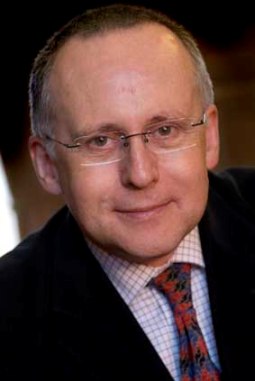
Are Young Earth Creationists, Intelligent Designers and other adherents of long-exploded ideas even worth the expenditure of our contempt?
Geoscientist 18.1 January 2008
Woody Allen observed, when discussing neo-Nazis during a cocktail party in his film Manhattan: "A satiric piece in The Times is one thing, but bricks and baseball bats really get to the point." And that point is, arguing with the closed-minded only serves to dignify their unacceptable dogmas.
Attentive readers of Geoscientist will know that it is the policy of this magazine not to engage in public debate with young-Earth creationists (YECs) because to do so lends them, and the mere notion that there is any "debate" to be had, a credibility they don't deserve. Tempting though it may be, in PR terms it is a tactical error to engage YECs in this way, because the very act of doing so hands a victory to the opponents of reason. This is so because the only result YECs desire is to foster in the minds of gullible people the illusion that they and their misguided notions are taken seriously by anyone who should be taken seriously.
President Robin Cocks, writing to The Times in 1999, established the Geological Society's position on faith and science. He wrote: "Science and religion coexist quite happily in the minds of all but the most strident fundamentalists (scientific or religious). Whereas science explores the empirical constitution of the universe, religion is the search for ethical values and spiritual meaning… Neither can trespass competently upon the domain of the other."
Science and religion, in other words, constitute "non-overlapping magisteria" (the "NOMA Principle", in Stephen Jay Gould's words). This is satisfying because although forcibly expounded by Gould (Hon. FGS) in more recent times, the concept originated with Thomas Henry Huxley, a former President of ours - who invented one of the most misunderstood words in the language to describe it. ("Agnostic" does not mean "undecided" - it means "unable to know" and is meant to encapsulate the scientist's position of being incompetent to judge any propositions that lie beyond nature).
But there is another problem. Too strident an approach towards YECs also plays into their hands by giving to those same gullible people mentioned earlier the impression that scientists are dogmatic and unwilling to entertain doubt. These are slippery slopes. Scientists are fully open to reasonable doubt, but see no point in being open to
unreasonable doubt. That is the same as being so open-minded that your brains fall out. Moreover, whether scientists like it or not, if people really want to believe that the Earth is 6000 years old or that it sits on the back of a giant turtle flying through celestial custard, then they are free to do so. Theirs is the same freedom that allows scientists to go on experimenting without fear of villagers with pitchforks and flaming torches.
So, tempted though I am to use baseball bats on YECs, I think I will stick to satire. But, just for the record, and because the issue that really matters is what the State allows to be taught under the National Curriculum, perhaps the Society should issue a statement of its own, along the lines of that already issued by the Royal? (see
Letters for more on this issue)